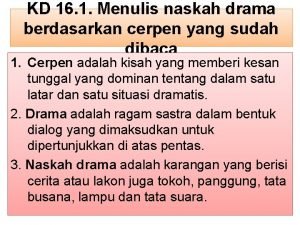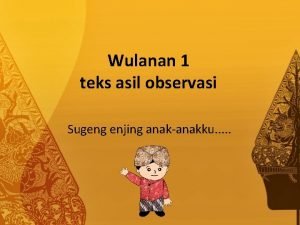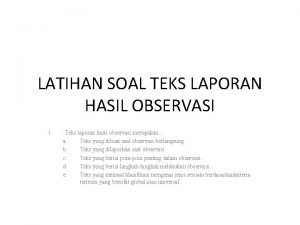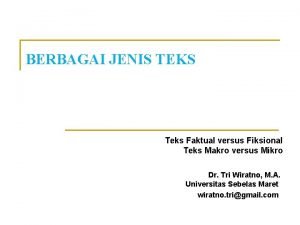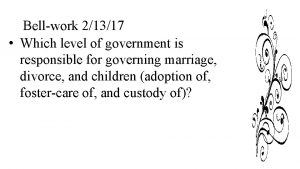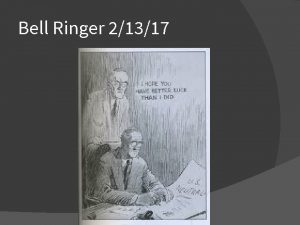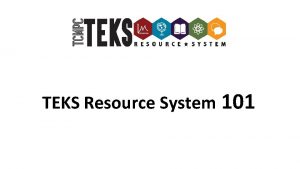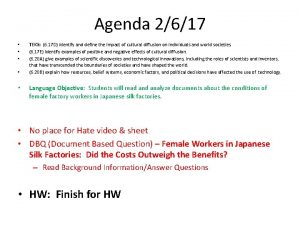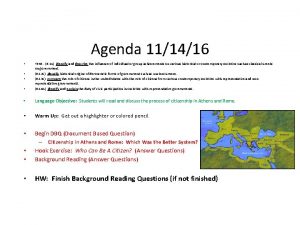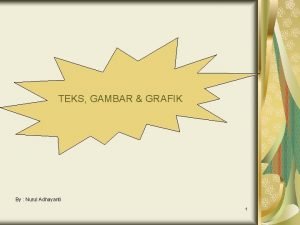Agenda 21317 TEKS 6 4 F identify the










































- Slides: 42

Agenda 2/13/17 • • TEKS: (6. 4 F) identify the location of major world countries such as Canada, Mexico, France, Germany, the United Kingdom, Italy, Spain, Norway, Sweden, Russia, South Africa, Nigeria, Iraq, Afghanistan, Israel, Iran, India, Pakistan, the People's Republic of China, the Republic of China (Taiwan), Japan, North and South Korea, Indonesia, and Australia. (6. 5 B) identify geographic factors such as location, physical features, transportation corridors and barriers, and distribution of natural resources that influence a society's ability to control territory. Language Objective: Students will work individually to discuss from the Nigerian’s point-of-view and their reactions to colonialism. • Video on Imperialism/slidehttp: //study. com/academy/lesson/european-imperialism -characteristics-motives-effects. html • Warm Up: 2 WARM UPS ( on next slides) • Facing Colonialism – How Would You Respond? • Event A: The Slave Trade • Event B: Protection Treaties and Christian Missionaries • HW: NONE

Warm up: • Imperialism: a policy by which a country increases its power by gaining control over other areas of the world • ^^^ copy down in warm up spot

• Imperialism, also called the Age of Imperialism marks a time period in history where powerful nations, most notably in Europe, conquered and exploited less powerful nations for their resources, raw materials, and oftentimes labor. Propelled by the new inventions of the Industrial Revolution (steam powered trains and boats), naval and military powers of the European nations were able to travel further and thus conquer further from the motherland. • During this time of Imperialism, European nations did not account for cultural differences of those conquered, and focused solely on creating an economic resource. Most of Africa, South and Southeast Asia, the Caribbean, Central and Latin America have been subjected to some type of imperial rule from 1750 -1914. In contrast to the time of Exploration and Colonialism, European Imperialism was driven by economic gain of resources and raw materials necessary to further technology and mass production such as Land, Labor, and Capital. • Embedded in the desire for greater economic gains, European Imperialist countries also pursued conquests because of a fundamental belief that their culture and way of life was superior to those of conquered peoples (which included Africa, Latin America, the Middle East, Southeast Asia).

http: //mhs. molineschools. org/media/files/2015/03/africapartition-1885 -1914. png




Warm Up #__ If three robbers with guns entered your house, would you: 1) Fight them 2) Cooperate so they would not hurt you or your family 3) Call the police and wait for assistance Explain why in complete sentences.

Agenda 2/14/17 • • • TEKS: (6. 4 F) identify the location of major world countries such as Canada, Mexico, France, Germany, the United Kingdom, Italy, Spain, Norway, Sweden, Russia, South Africa, Nigeria, Iraq, Afghanistan, Israel, Iran, India, Pakistan, the People's Republic of China, the Republic of China (Taiwan), Japan, North and South Korea, Indonesia, and Australia. (6. 5 B) identify geographic factors such as location, physical features, transportation corridors and barriers, and distribution of natural resources that influence a society's ability to control territory. Language Objective: Students will work individually to discuss from the Nigerian’s point-of-view and their reactions to colonialism. • 1. Assign HW • 2. Facing Colonialism – How Would You Respond? • Event C: Jaja of Opobo • Event D: Lagos and Chief Oluwa • Event E: Women’s Reaction to Colonial Taxes • Closing Thought- on next slide • HW: Control of Africa Activity-Color in the European power that controls each respective African nation. - due FRIDAY FEB 17 th •

Closing thought #7: Question: Which of the following best summarizes an effect of imperialism? • a. Conquered regions became rich from the Europeans • b. Land was distributed equally among the colonies • c. The wealth of European powers increased at the expense of their colonies • d. Farming stopped






Agenda 2/15/17 • • TEKS: (6. 1 A) trace characteristics of various contemporary societies in regions that resulted from historical events or factors such as invasion, conquests, colonization, immigration, and trade. (6. 1 B) analyze the historical background of various contemporary societies to evaluate relationships between past conflicts and current conditions. (6. 4 C) explain ways in which human migration influences the character of places and regions. Language Objective: Students will understand how European nations colonize Africa and divided Africa for their own benefit. • Imperialism in Africa Map activity • Imperialism in Africa handout • Closure: review African Imperialism map activity • HW: none

Agenda 2/16/17 • • • TEKS: (6. 1 A) trace characteristics of various contemporary societies in regions that resulted from historical events or factors such as invasion, conquests, colonization, immigration, and trade. (6. 1 B) analyze the historical background of various contemporary societies to evaluate relationships between past conflicts and current conditions. (6. 15 F) identify and explain examples of conflict and cooperation between and among cultures. (6. 17 A) identify and describe how culture traits spread such as trade, travel, and war. (6. 17 D) identify and define the impact of cultural diffusion on individuals and world societies. • Language Objective: Students will take notes on the causes of World War I. • • **GET SPIRALS** 1. Video – Causes of World War I 2. Warm up: What actually caused the start of World War I? 3. The Causes of World War I- STOP AT LUSITANIA • HW: None

Nationalism • Strong pride in one’s nation or ethnic group

Colonialism • System by which a country maintains colonies outside its borders






U. S. Involvement RMS Lusitania

Pass out Lusitania handouts


Zimmerman Telegram

Zimmerman Telegram (decoded)

WWI Weapons video- 2 mins • https: //www. youtube. com/watch? v=c. Lxz. D 6 Luj 4

Advances in Warfare

British infantry advancing through gas

German U-Boat

Tanks Machine Guns

WWI was primarily fought in trenches, which were dug by the armies for better defense.







Agenda 2/17/17 - Early dismissal • • • TEKS: (6. 1 A) trace characteristics of various contemporary societies in regions that resulted from historical events or factors such as invasion, conquests, colonization, immigration, and trade. (6. 1 B) analyze the historical background of various contemporary societies to evaluate relationships between past conflicts and current conditions. (6. 15 F) identify and explain examples of conflict and cooperation between and among cultures. (6. 17 A) identify and describe how culture traits spread such as trade, travel, and war. (6. 17 D) identify and define the impact of cultural diffusion on individuals and world societies. • Language Objective: Students will take notes on the causes of World War I. • • **GET SPIRALS** 1. Turn in HW- European Imperialism Maps 2. The Causes of World War I- Finish Notes 3. Closure “expert”- student summarizes and shares what they learned in class • HW: NONE
 Agenda sistemica y agenda institucional
Agenda sistemica y agenda institucional Jelaskan tentang membangun teks laporan secara bersama-sama
Jelaskan tentang membangun teks laporan secara bersama-sama Ubahlah kutipan cerpen berikut menjadi naskah drama
Ubahlah kutipan cerpen berikut menjadi naskah drama Apa itu panyaruwe
Apa itu panyaruwe Jenis teks laporan hasil observasi mendeskripsikan
Jenis teks laporan hasil observasi mendeskripsikan Thiếu nhi thế giới liên hoan
Thiếu nhi thế giới liên hoan Chúa sống lại
Chúa sống lại điện thế nghỉ
điện thế nghỉ Một số thể thơ truyền thống
Một số thể thơ truyền thống Trời xanh đây là của chúng ta thể thơ
Trời xanh đây là của chúng ta thể thơ Sơ đồ cơ thể người
Sơ đồ cơ thể người Các số nguyên tố
Các số nguyên tố Tỉ lệ cơ thể trẻ em
Tỉ lệ cơ thể trẻ em Vẽ hình chiếu vuông góc của vật thể sau
Vẽ hình chiếu vuông góc của vật thể sau đặc điểm cơ thể của người tối cổ
đặc điểm cơ thể của người tối cổ Các châu lục và đại dương trên thế giới
Các châu lục và đại dương trên thế giới ưu thế lai là gì
ưu thế lai là gì Kể tên các môn thể thao
Kể tên các môn thể thao Tư thế ngồi viết
Tư thế ngồi viết Cái miệng nó xinh thế
Cái miệng nó xinh thế Hình ảnh bộ gõ cơ thể búng tay
Hình ảnh bộ gõ cơ thể búng tay Cách giải mật thư tọa độ
Cách giải mật thư tọa độ Tư thế ngồi viết
Tư thế ngồi viết V. c c
V. c c Voi kéo gỗ như thế nào
Voi kéo gỗ như thế nào Thẻ vin
Thẻ vin Thể thơ truyền thống
Thể thơ truyền thống Sự nuôi và dạy con của hổ
Sự nuôi và dạy con của hổ Từ ngữ thể hiện lòng nhân hậu
Từ ngữ thể hiện lòng nhân hậu Diễn thế sinh thái là
Diễn thế sinh thái là Thế nào là hệ số cao nhất
Thế nào là hệ số cao nhất Frameset trong html5
Frameset trong html5 Vẽ hình chiếu vuông góc của vật thể sau
Vẽ hình chiếu vuông góc của vật thể sau 101012 bằng
101012 bằng Lời thề hippocrates
Lời thề hippocrates Vẽ hình chiếu đứng bằng cạnh của vật thể
Vẽ hình chiếu đứng bằng cạnh của vật thể Chụp tư thế worms-breton
Chụp tư thế worms-breton đại từ thay thế
đại từ thay thế Quá trình desamine hóa có thể tạo ra
Quá trình desamine hóa có thể tạo ra Công của trọng lực
Công của trọng lực Sự nuôi và dạy con của hổ
Sự nuôi và dạy con của hổ Thế nào là mạng điện lắp đặt kiểu nổi
Thế nào là mạng điện lắp đặt kiểu nổi Các châu lục và đại dương trên thế giới
Các châu lục và đại dương trên thế giới


